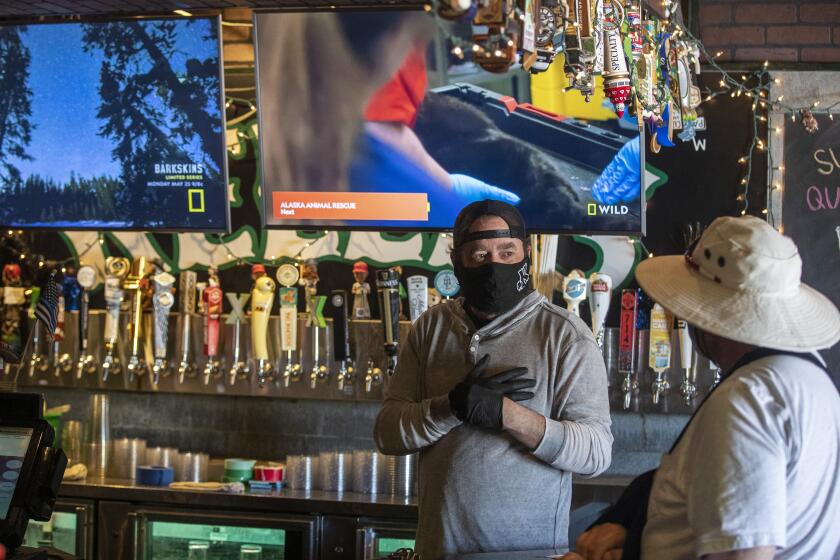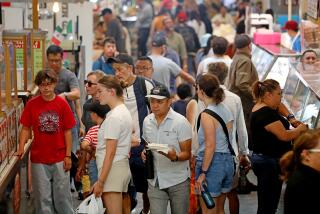Inside California courts, lawyers fume that mask wearing is mixed during pandemic
Christine Kroger, a deputy public defender in San Joaquin County, did an “inventory” last week to see how many people were wearing face coverings in the county’s courthouse.
She toured every Superior Court department that was open.
In 7A, she reported: “Judge and court clerk had masks, court reporter had mask around nose, bailiff, no mask, D.A., no mask.”
In 7C, judge and court clerks wore masks; one bailiff had a mask, the other did not.
Although Gov. Gavin Newsom has issued a statewide mask order, compliance in some California courthouses has been spotty, particularly among sheriff‘s deputies, public defenders and court officials say.
Kroger made it her mission to ensure that masks were worn in the San Joaquin County courthouse.
“I am angry that my co-workers are being put in peril and potentially bringing the virus back to the office because we have a bunch of idiots over there who don’t want to follow the rules,” Kroger said in an interview.
Since the pandemic began, the sight of law enforcement officers without masks has drawn criticism and controversy. Those who failed to wear face coverings during the Black Lives Matters protests drew particular attention.
But inside buildings, there’s an elevated risk of spreading the coronavirus. Since courts began reopening, presiding judges have ordered those entering to mask up, but making sure everyone does has been challenging.
Going to court for most people is compulsory. Jurors are being seated once again, lawyers must represent their clients, prosecutors must prosecute, judges must preside, court staff must be on hand to interpret and report proceedings. Sheriff‘s deputies serve as bailiffs in county courts and escort jail inmates in and out for hearings.
Kroger, angry about what she was seeing, wrote a letter that was sent to the county Board of Supervisors. She contacted her City Council member and the state Judicial Council, which Chief Justice Tani Cantil-Sakauye heads and which sets court rules. Her office wrote a letter to the presiding judge, and she called her local newspaper.
She said she was angered that criminal defendants face penalties for violating society’s rules and cannot enter courtrooms without masks, yet “law enforcement and the judiciary seem not to have to follow the same rules that my clients have to follow.”
A health order issued Friday requires Orange County residents to wear cloth face coverings when in a public setting.
The San Joaquin County Sheriff’s Department finally took notice last week, ordering all deputies to wear masks. The order came after The Times inquired about the department’s mask policy.
Brandon E. Riley, the executive officer for the San Joaquin County Superior Court, said staff members take the temperature of everyone who enters the courthouse and distribute masks.
“We don’t have enough staff to follow them around the courthouse, but we expect them to wear it,” he said.
He said that court staff wear face coverings, except those who have medical reasons for not donning them. In that case, Kroger said, they should be wearing face shields.
“I do understand the concern,” said Riley, himself a mask wearer, “but we have applied the guidance to the fullest extent that we can.”
Oscar Bobrow, who heads the California Public Defenders Assn., surveyed his members to determine which courts were complying with the mask rule.
Most who replied, including public defenders in Riverside, Yolo, San Bernardino, Santa Clara, Ventura, San Diego, Sacramento, Napa, Nevada, Monterey, Los Angeles and Orange counties, said bailiffs were wearing masks, with some lapses.
Bobrow, who is chief deputy public defender for Solano County, said some sheriff‘s deputies and court reporters there still do not wear masks, though compliance improved after the court’s presiding judge issued an order on June 18 mandating face coverings.
In the Tehama County Superior Court, some sheriff‘s deputies wear masks, others don’t, said Chief Court Executive Officer Kevin Harrigan. “The Sheriff’s Department has cited an exclusion” for mask wearing, he said.
After a June 18 court order directing all people entering the Tehama County Courthouse to wear face coverings, Sheriff-Coroner Dave Hencratt developed a written policy.
“The purpose of this policy is to mitigate extreme peril to Deputies, which may result from the State’s Guidance Document for the use of face coverings and the order of the Tehama County Superior Court mandating face coverings/Masks,” the sheriff wrote.
The policy says a mask “severely hampers” deputies’ “command presence,” reduces the senses of smell and taste needed to detect smoke, chemicals or alcohol, causes fogging when worn with glasses and may restrict breathing. In addition, the sheriff wrote, prolonged wearing of a mask could trigger “anxiety and claustrophobic reactions.”
The dangers deputies face are “much more imminent and by far outweigh the risk of exposure or transmission of almost any airborne pathogen,” he said.
But in a memorandum to the court, the sheriff said deputies in the court should abide by state guidance.
The Sheriff’s Department did not respond to a request for an interview.
In Fresno County, a sheriff’s spokesman said all deputies were required to wear masks in the courtrooms unless they were alone. But Fresno County Deputy Public Defender Stephanie Negin said some deputies in courtrooms still do not wear them, even though more than 600 people at the Fresno County Jail have COVID-19, including more than two dozen correctional officers.
Negin said one of her colleagues contracted the disease from a client, an inmate. Jail inmates wear masks made with a material she likened to a light T-shirt. She said clients have told her they wash the masks at night if they can obtain soap.
Not wearing a face mask is reckless. But in a weird way, it seems a little less so in Modoc County, which hasn’t had a single case of the coronavirus.
Unlike sheriff‘s deputies, Fresno police have been wearing masks, she said, which she has seen from reviewing video of body cameras.
Kroger is pleased that San Joaquin County deputies have been told to cover their faces in court, but knows compliance is likely to be a challenge.
When she did her “inventory” last week, she said, she walked into a courtroom and saw a bailiff who was not wearing a mask. When he saw her, he quickly put one on, she said.
“Several security guards had their masks not covering their noses,” she said. “One had his hanging from his ear when I was leaving.”
More to Read
Sign up for Essential California
The most important California stories and recommendations in your inbox every morning.
You may occasionally receive promotional content from the Los Angeles Times.












